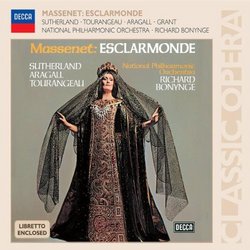| All Artists: Jules Massenet, Richard Bonynge, National Philharmonic Orchestra, Clifford Grant, Giacomo Aragall (Aragali), Graham Clark, Huguette Tourangeau, Ian Caley, Joan Sutherland, Louis Quilico, Robert Lloyd, Ryland Davies Title: Massenet: Esclarmonde Members Wishing: 1 Total Copies: 0 Label: Decca Release Date: 10/10/2006 Genre: Classical Style: Opera & Classical Vocal Number of Discs: 3 SwapaCD Credits: 3 UPC: 028947579144 |
Search - Jules Massenet, Richard Bonynge, National Philharmonic Orchestra :: Massenet: Esclarmonde
 | Jules Massenet, Richard Bonynge, National Philharmonic Orchestra Massenet: Esclarmonde Genre: Classical
|
Larger Image |
CD Details |
CD ReviewsOutstanding Opera The Cultural Observer | 06/08/2007 (5 out of 5 stars) "Massenet's Esclarmonde is a very rarely performed work, and after listening to this recording, one can see why. The title role requires the voice of a dramatic coloratura soprano, a very rare species of soprani rarer probably than Wagner's great hochdramatische sopranos. In fact, I know of only two sopranos who possess this certain kind of voice--Maria Callas and Joan Sutherland. Both singers had voices the size fit for Wagnerian roles, but had the agility so required for the bel canto repertoire. In a role such as Esclarmonde, Joan Sutherland had the advantage over Callas due to the fascinating ease of her upper register. The title role in Esclarmonde not only has to endure the kind of vocal writing which makes them sing their parts with an agility required of a Konigin der Nacht, but also a vocal size large enough to carry over an orchestra equivalent to that used by Wagnerian operas. Natalie Dessay can easily sing the role, for example, but when Massenet decides to emulate a Wagnerian orchestra...well, Dessay will probably end up losing her voice. Anyways, Joan Sutherland is fantastic in the role. She handles the coloratura with such an agility that if this were her only role, it would make her singing legendary. It is an excellent characterization of the wronged sorceress, and I would recommend this recording highly for anyone willing to listen to Massenet composing out of his regular intimate drama. Giacomo Aragall, Clifford Grant (an excellent Fafner, by the way), Graham Clark, and Tourangeau, all make up an excellent supporting cast for La Stupenda. That said, I must also commend Bonynge for his excellent conducting in such a rarely performed work. " Massenet is not Wagner - thank God! Edward Flaspoehler | Dallas, TX | 10/09/2007 (5 out of 5 stars) "I have listend to this recording many times, and like it very much. It is a wonderful opera and a thrilling performance. Joan Sutherland is at her best, and the rest of the cast is fine. However, any resemblance to Wagner is merely superficial, and apparently based on a casual use of Leitmotives. To me, this music does not sound like Wagner at all, and comes nowhere near his use of chromaticism and symphonic development, not to mention psychological depth. In fact, I think calling it Wagnerian based on merely the size of the orchestra does both Wagner and Massenet an injustice. Massenet speaks for himself, and does not need to be compared to any other composer, including Wagner."
|

 Track Listings (15) - Disc #1
Track Listings (15) - Disc #1